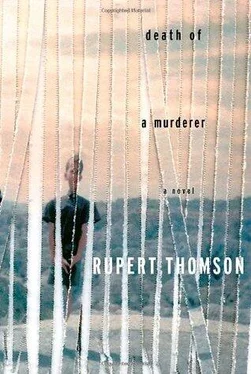He drove over the Runcorn — Widnes bridge, its struts criss-crossing above his head. Once on the south side, there was almost no traffic. Sometimes a taxi would cruise past in the fast lane, men full of beer being ferried back to their four-bedroom houses after a day at the football or the races. He slowed for a roundabout, then followed the signs to North Wales. The road was even emptier now. To the west, over the marshy fields, he could see flames burning in the tops of chimneys at the oil refinery. Twenty-five to twelve, and most of the clouds had blown away, though the weather-man was forecasting rain before morning.
He took a right turn, on to the A540. The smell of silage stole into the car. He was entering the Wirral, where Venetia’s father lived, and a knot formed in his stomach. He switched the radio off; the voices were too warm, too reassuring. What he was about to do lay to one side of all that.
Beyond Heswall, Billy parked on an unlit lane and walked off into a copse with his bag. When he was hidden from the road, he quickly changed into his uniform. At home, he had removed his silver epaulette numbers and replaced them in a jumbled order, on the off-chance that McGarry made a note of his number and reported him. He doubted that anyone would think of checking officers as far afield as Widnes. Still, it was best to take precautions.
As he continued towards West Kirby, the houses fell away. At first, the land opened out into a kind of heath or common — a golf course wouldn’t have looked out of place — but then high walls of gorse-studded rock closed in around the car. He turned left at a junction marked by an obelisk, the road doubling back on itself and looping down towards the river. The cul-de-sac where McGarry lived appeared on his right — he had memorised the address — but he drove beyond it, parking in a pub car-park at the bottom of the hill. Since he was in uniform, every action had to be carried out with absolute conviction and authority. He was on duty now. He was the law.
From the car-park a footpath led back up the hill. Trees dripping and creaking, uneven walls of ivy-covered brick. There were some steps, then the path narrowed. Billy emerged halfway along the cul-de-sac, with McGarry’s house directly in front of him. His footsteps echoed as he crossed the street. To his left, a thin moon tilted above a steep slate roof.
McGarry’s front door was on the right side of the house and set well back from the pavement. Billy didn’t hesitate. As he started up the path, a high leylandii hedge screened him from the next-door neighbours, but he could still be spotted by the people living opposite. Not that they would be able to describe him. It was dark, and he was more than fifty yards away. Once people noticed a uniform, it tended to blind them to all sorts of other details. A policeman, they would say, and they might have some vague notion of his size or height, but that would be all. In any case, Billy’s aim was not so much to come and go unseen as to conceal his actual identity. If a neighbour saw a policeman arrive, so much the better. It would put McGarry under still more pressure. After all, the police don’t appear in the middle of the night unless it’s serious. Were a neighbour to bring up the subject, casually, in conversation, McGarry would be unlikely to tell the truth. Given what Billy was about to say, he also doubted that McGarry would go to the authorities. If he did, he would only draw attention to the secret he had hidden successfully for so many years. In the end, then, having thought the whole thing through, Billy wasn’t convinced that he would need an alibi at all.
He rang the bell twice, firmly, and stood back. He glanced at his watch. Twelve twenty-three. Somewhere in the depths of the house he imagined that he heard a click. He was about to ring again when a voice spoke from the other side of the door.
“Who is it? Who’s there?”
The Scottish accent was unmistakable. Billy had come to the right house.
“Open the door,” he said. “This is the police.”
Not a sound from inside. Had McGarry’s heart lurched at the mention of the word “police”? Was Billy’s strategy already beginning to take effect?
At last a key turned in the lock, and the door opened, revealing an old man in a dark-red dressing-gown and leather slippers.
Billy took out his pocketbook and consulted a blank page. “Mr. McGarry?” he said. “Mr. George McGarry?”
“Yes?”
“I’m a police officer. I need to talk to you — in private.”
“I was asleep.”
“I’m afraid this can’t wait.” Billy stepped past him into the hall.
Once the old man had locked the front door again, he opened a door to his immediate left and switched on the light. Billy followed him into a library. Its many shelves were filled with non-fiction, mostly, and works of reference, but there was also evidence of McGarry’s interests and accomplishments: paintings of racehorses and battleships hung on the walls, and the mantelpiece was crowded with sporting trophies — rowing, tennis, golf — all of which McGarry seemed to have won himself. On the sideboard, flanking a glass case that contained a scale model of an ocean liner, were two photographs in silver frames, one of Venetia, the other of a girl who was fuller in the face, and lighter in colouring. This would be Margaret, the sister. Significantly, both pictures had been taken when the girls were much younger.
The old man was surveying Billy from a position just inside the door, the whites of his eyes visible below his pupils so that he appeared to be looking into the air above Billy’s head, or at some judgement that might, at that very minute, be hanging over him. Of the energy and charm that Venetia had alluded to, there was no sign, illness and old age having taken their toll. His face was flushed, and the skin around his mouth and eyes was pouchy, loose, discoloured; he looked like what he was, a man in his early seventies with a bad heart. None of this was entirely unexpected. What Billy hadn’t reckoned on — or even considered — was the family resemblance. When Venetia told him how her father had abused her, he had imagined a deviant, a pervert, someone who stood out from the rest of society, but this old man not only resembled any other old man you might see on the street or in a shop, he also resembled his daughter. He looked like Venetia. This bizarre similarity wrongfooted Billy for a moment, and he found himself wondering why Venetia hardly ever mentioned her mother. In that hotel in the North Pennines, she had described her mother as “delicate,” he remembered, and it occurred to him that Mrs. McGarry must already be dead.
“Well?” the old man said. “What is it?”
The curt tone, a relic of McGarry’s arrogance, gave Billy his ground back.
“Some allegations have been made against you,” he said. “Some very serious allegations.”
“Allegations? What allegations? What are you talking about?”
The old man turned and lowered himself into a nearby chair. He was avoiding eye contact and using too many words, which Billy interpreted as signs of unease, if not of guilt.
“Sexual abuse,” Billy said, “of minors.”
“ What? How dare you!”
“We have it on good authority, Mr. McGarry, that you’ve had sex with underage girls. You’ve been interfering with young girls—”
“Don’t use those words in my house.” Rising out of his chair, the old man seemed about to launch himself at Billy; white froth had gathered at the corners of his mouth. “This is my house. You’re not using language like that in here.”
“You never spared a thought for them, did you? You never cared about them. You only ever thought about yourself.”
As always.
Читать дальше












